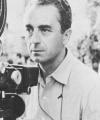Watch
Room 666

Room 666
Room 666
1982
Documentary
TV Movie
45m
During the 1982 Cannes Film Festival, Wenders asks a number of film directors from around the world to get, each one at a time, into a hotel room, turn on the camera and sound recorder, and, in solitude, answer a simple question: "What is the future of cinema?". (imdb)
Directed by:
Wim WendersWenders graduated from the Gymnasium (high school) in Oberhausen, in the Ruhr area. He then studied medicine (1963-64) and philosophy (1964-65) in Freiburg and Düsseldorf. However, he dropped out of school and moved to Paris in October 1966 to become a painter. Wenders failed his entry test at France's national film school IDHEC (La Fémis at present), so instead became an engraver in the studio of Johnny Friedlander, an American artist, in Montparnasse. During this time, Wenders became fascinated with cinema, and saw up to 5 movies a day at the local movie theater.

Writer:
Wim WendersWenders graduated from the Gymnasium (high school) in Oberhausen, in the Ruhr area. He then studied medicine (1963-64) and philosophy (1964-65) in Freiburg and Düsseldorf. However, he dropped out of school and moved to Paris in October 1966 to become a painter. Wenders failed his entry test at France's national film school IDHEC (La Fémis at present), so instead became an engraver in the studio of Johnny Friedlander, an American artist, in Montparnasse. During this time, Wenders became fascinated with cinema, and saw up to 5 movies a day at the local movie theater.

Starring:
Steven SpielbergAn amateur filmmaker even as a child, Spielberg became one of the youngest television directors for Universal in the 60s. A highly praised television film started up his career as a director for cinema, and quickly became one of the most popular, influential and recognizable faces in history. Spielberg has received many awards throughout his distinguished career, Winning three Academy Awards ( Being nominated for six ) and seven of his films have been nominated for the Best Picture Oscar ( Winning 1 ).

Wenders graduated from the Gymnasium (high school) in Oberhausen, in the Ruhr area. He then studied medicine (1963-64) and philosophy (1964-65) in Freiburg and Düsseldorf. However, he dropped out of school and moved to Paris in October 1966 to become a painter. Wenders failed his entry test at France's national film school IDHEC (La Fémis at present), so instead became an engraver in the studio of Johnny Friedlander, an American artist, in Montparnasse. During this time, Wenders became fascinated with cinema, and saw up to 5 movies a day at the local movie theater.

was born in 1912 into a middle-class family and grew up in bourgeois surroundings of the Italian province. In Bologna he studied economics and commerce while he painted and also wrote criticism for a local newspaper. In 1939 he went to Rome and worked for the journal "Cinema" studying directorship at the School of Cinema. As he was indebted to neorealism his films reflect his bourgeois roots like in his first movie Story of a Love Affair (1950) or The Lady Without Camelias (1953) or Le Amiche.

Ratings & Reviews
Cast & Info
Directed by:
Wim WendersWenders graduated from the Gymnasium (high school) in Oberhausen, in the Ruhr area. He then studied medicine (1963-64) and philosophy (1964-65) in Freiburg and Düsseldorf. However, he dropped out of school and moved to Paris in October 1966 to become a painter. Wenders failed his entry test at France's national film school IDHEC (La Fémis at present), so instead became an engraver in the studio of Johnny Friedlander, an American artist, in Montparnasse. During this time, Wenders became fascinated with cinema, and saw up to 5 movies a day at the local movie theater.

Writer:
Wim WendersWenders graduated from the Gymnasium (high school) in Oberhausen, in the Ruhr area. He then studied medicine (1963-64) and philosophy (1964-65) in Freiburg and Düsseldorf. However, he dropped out of school and moved to Paris in October 1966 to become a painter. Wenders failed his entry test at France's national film school IDHEC (La Fémis at present), so instead became an engraver in the studio of Johnny Friedlander, an American artist, in Montparnasse. During this time, Wenders became fascinated with cinema, and saw up to 5 movies a day at the local movie theater.

Starring:
Steven SpielbergAn amateur filmmaker even as a child, Spielberg became one of the youngest television directors for Universal in the 60s. A highly praised television film started up his career as a director for cinema, and quickly became one of the most popular, influential and recognizable faces in history. Spielberg has received many awards throughout his distinguished career, Winning three Academy Awards ( Being nominated for six ) and seven of his films have been nominated for the Best Picture Oscar ( Winning 1 ).

Wenders graduated from the Gymnasium (high school) in Oberhausen, in the Ruhr area. He then studied medicine (1963-64) and philosophy (1964-65) in Freiburg and Düsseldorf. However, he dropped out of school and moved to Paris in October 1966 to become a painter. Wenders failed his entry test at France's national film school IDHEC (La Fémis at present), so instead became an engraver in the studio of Johnny Friedlander, an American artist, in Montparnasse. During this time, Wenders became fascinated with cinema, and saw up to 5 movies a day at the local movie theater.

was born in 1912 into a middle-class family and grew up in bourgeois surroundings of the Italian province. In Bologna he studied economics and commerce while he painted and also wrote criticism for a local newspaper. In 1939 he went to Rome and worked for the journal "Cinema" studying directorship at the School of Cinema. As he was indebted to neorealism his films reflect his bourgeois roots like in his first movie Story of a Love Affair (1950) or The Lady Without Camelias (1953) or Le Amiche.

Loading ...
Similar Titles
Loading ...
Statistics
Loading ...
Trailer
Loading ...



















